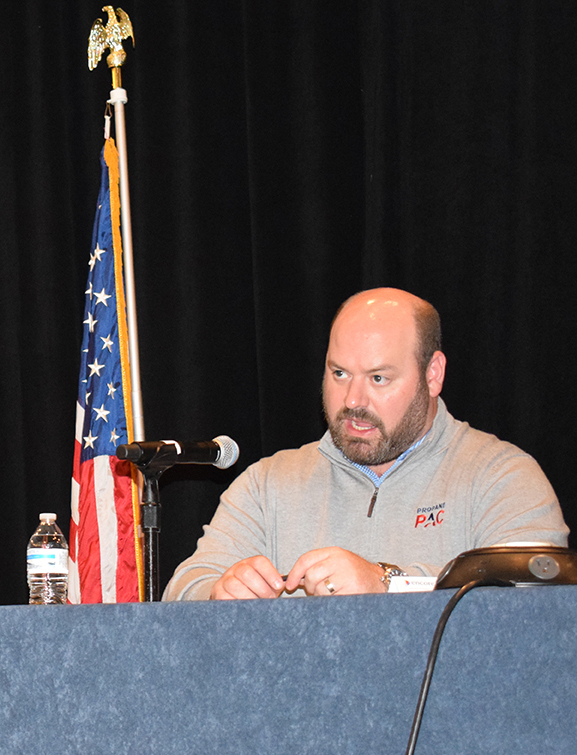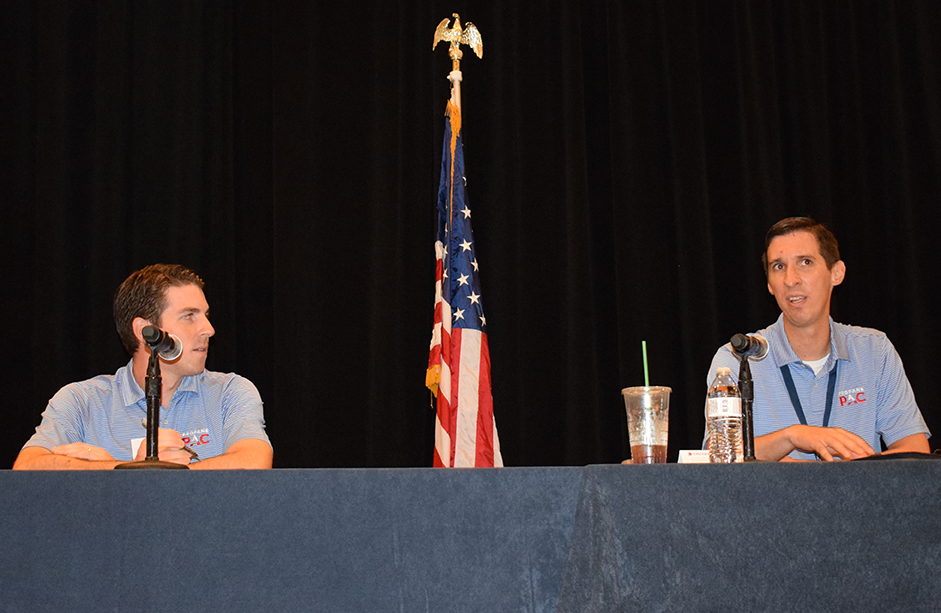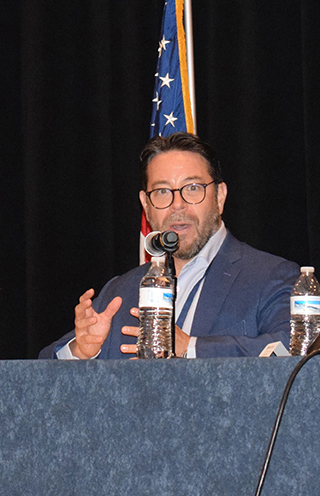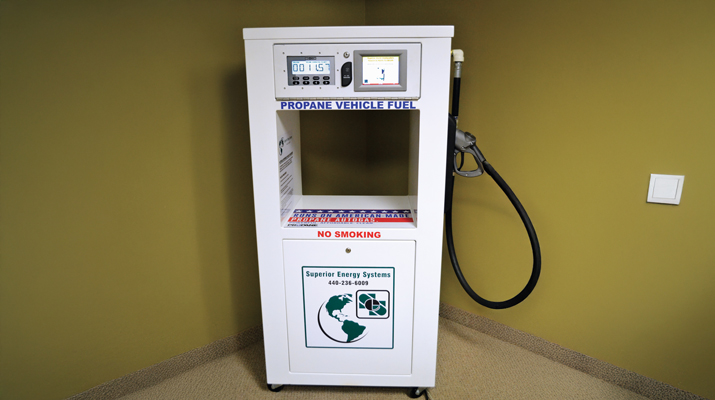Forum brings industry together to talk propane, policy
In the heart of Washington, D.C., with the U.S. Capitol visible in the distance, National Propane Gas Association (NPGA) leaders urged propane industry members to put politics aside for the sake of their businesses.

Michael Baker is the senior director of legislative affairs at the National Propane Gas Association. Photo by LP Gas staff
“Just because you have a different political view from your legislator, it doesn’t mean that you can’t go see him,” says Michael Baker, senior director of legislative affairs at NPGA.
“Approach these things as a constituent,” he adds. “This member of Congress, whether you voted for him or not, represents you. It’s OK to think differently. Instead of focusing on what divides you, see where you have a connection. Focus on the things that you do have in common.”
Policies and politics dominated much of the discussion during NPGA’s first in-person event since its winter board of directors meeting in February 2020, right before the pandemic hit. Instead of its annual Propane Days lobbying event this past June, the association held a policy forum in connection with its mid-year board meeting.
Among the points attendees heard: The political environment in Washington, D.C., isn’t consistent with the divisiveness portrayed by the media.
“What is portrayed in the public in terms of the bipartisan climate of Capitol Hill is not indicative of what’s going on between members and the two houses,” says Andrew Hogin, the deputy chief of staff for Sen. Bill Hagerty, R-Tennessee.
Therefore, conversation, compromise and progress are possible at a time when some policymakers are looking to legislate propane out of the energy mix.
“You got to get in the game,” instructed Malcolm Barrett of Barrett Propane to fellow industry members.
That game can take place all over the country – not just in the nation’s capital.
“Our membership has more power than anybody. You are the employers, keeping homes warm, supplying the industry – that’s the best story to tell,” Baker says. “Having regular communication with your legislator back in your home state can help.”
It’s also important to meet with legislative staff, Baker adds. That might entail reaching out to a district office and connecting with field staff designated for certain policy issues.
“The benefit is it’s not just about a one-time visit; it’s about establishing a relationship with your business,” says Baker, noting how NPGA can help industry members gain traction with congressional offices.
Baker’s recommendations came during a discussion about the PropanePAC, NPGA’s political action committee, and contributions that help the industry get direct face time with members of Congress. Chad Kroening of Boehlke Bottled Gas and Peter Ferrell of NPGA led that part of the discussion.

The National Propane Gas Association’s Tyler Lawrence, left, and Peter Ferrell discuss advocacy efforts on Capitol Hill. Photo by LP Gas staff
Policy positions
Cybersecurity threats: Cybersecurity is a growing concern, especially in light of the Colonial Pipeline ransomware attack in May.
NPGA officials say they are working with the Information Sharing and Analysis Centers to track and report the industry’s security concerns.
“We have access to this group; if your company sees cyberthreats or has a concern about cybersecurity, let me know because we are working with this organization,” says Mike Caldarera, senior vice president of advocacy and technical services at NPGA.
NPGA also has membership in the Oil and Natural Gas Subsector Coordinating Council, which represents private sector interests of the oil and natural gas industry. It is composed of other oil and natural gas industry trade associations. During the Colonial Pipeline hack, NPGA participated in daily conference calls between the oil and gas industry and government officials from the Department of Energy.
“An upstream shutdown would have impacted the production of propane,” Caldarera says.
In May, the Department of Homeland Security’s Transportation Security Administration announced a security directive that will enable the department to better identify, protect against and respond to threats to critical companies in the pipeline sector.
Hazard Communication Standard: In February, the Occupational Safety and Health Administration (OSHA) issued a proposed rule to update the agency’s Hazard Communication Standard (HCS) to align with the seventh revision of the Globally Harmonized System of Classification and Labelling of Chemicals (GHS).
The standard identifies and classifies information on chemical hazards for workers, including container labels, safety data sheets and employee training.
One proposal in particular could have big implications for the propane industry, NPGA officials say. Proposed OSHA changes to the label component would require a “released for shipment” date.
OSHA intends for the shipment date to assist in circumstances where chemicals are held for long periods of time before shipment and chemical manufacturers identify new hazards for the chemical, NPGA explains. The supply chain for products like propane experience significant turnover, the association argues, and do not sit for extended periods of time.
If finalized, the rule may force propane businesses to relabel containers and include the “released for shipment” dates anytime a propane tank is filled – an onerous requirement for the industry, Caldarera explains.
The association submitted comments on behalf of its members, urging the agency to eliminate or adjust language in the proposed regulatory text to avoid confusion and any unnecessary burden on downstream propane companies.
Entry-level driver training: Federal Motor Carrier Safety Administration (FMCSA) entry-level driver training regulations for new commercial driver’s license and hazardous materials endorsement applicants take effect Feb. 7, 2022.
NPGA is working with the Propane Education & Research Council on providing educational and training materials for the industry to meet the new FMCSA requirements, which entail theory and behind-the-wheel instruction. The association is also planning to offer an administrative service, helping industry members and non-members with registration and record keeping. NPGA also views the service as a potential new revenue stream.
Ban the bans
NPGA’s “ban-the-gas-ban” legislative effort began in 2020 as part of a national energy coalition to stop cities and counties from restricting consumer energy choice in a pro-electrification political climate. Forty-five cities have banned gas since mid-2019 through ordinances or reach codes exceeding state building code standards, says Lesley Garland, vice president of state affairs at NPGA.
Twenty-seven percent of the industry’s 10 billion retail gallons are protected by ban-the-gas-ban laws, and Garland expects that total to grow to 45 percent by year’s end.
“We’re already preparing to defend these laws throughout the country,” she says.
World affairs
The forum also contained an international component, with Michael Kelly of the World LPG Association (WLPGA) and other global leaders joining a panel discussion.

Michael Kelly of the World LPG Association. Photo by LP Gas staff
Kelly shared examples of gas ban challenges seen in other countries; calls for no new investments in fossil fuels; and the release of the International Energy Agency’s “Net Zero by 2050” road map for the global energy sector.
“We are in the fight of our lives,” says Kelly, calling for the LPG industry to work together on a global scale.
With talk of Europe ahead of the U.S. on the path to reducing carbon emissions, panelists were asked about what they’d change five years ago with the knowledge they have today.
“We would have gone out and communicated and engaged with the outside world,” says Esther Busscher, head of group public affairs at SHV Energy and the president of Liquid Gas Europe. “For a very long time, we’ve been talking to ourselves, which is important because we need to be aligned, but we missed a window of opportunity where other industries did jump in. … Now, in times of distress, make friends before you need them.”
Adds Henry Cubbon, managing director of DCC LPG and president of the WLPGA, “If we knew we would be in the fight of our life, we would have mobilized a lot faster and been more aggressive in what we’re doing.”
But the industry is making progress, Cubbon says.
“We are beginning to get the message through,” he adds. “There is positivity coming out of this as well.”
Quick takes
⦁ The congressional appropriations process, grant funding and alternative fuel tax credits are opportunities NPGA pursues in the autogas market, Tyler Lawrence, senior manager of legislative affairs, shared during an autogas advocacy panel.
⦁ A new proposal for the 2023 edition of the National Fire Protection Association’s Liquefied Petroleum Gas Code (NFPA 58) would allow end-use customers to fill their own propane-fueled vehicles, with some requirements.
⦁ NPGA has worked over the last five years to help the industry maintain the unvented heater market. “Those folks wanting to do away with unvented heaters are still at it,” says Bruce Swiecicki, senior technical adviser at NPGA, referencing ASHRAE Standard 62.2. “We’re looking for ways we can compromise with them to address the committee’s concerns about indoor air quality.”
⦁ The NFPA is looking to develop a new standard that would address fire protection of cannabis growing and processing facilities.
NPGA shares information about regulatory and legislative issues affecting the industry in the member dashboard section of its website (npga.org).
Featured photo: Elisank79/iStock / Getty Images Plus/Getty Images
















